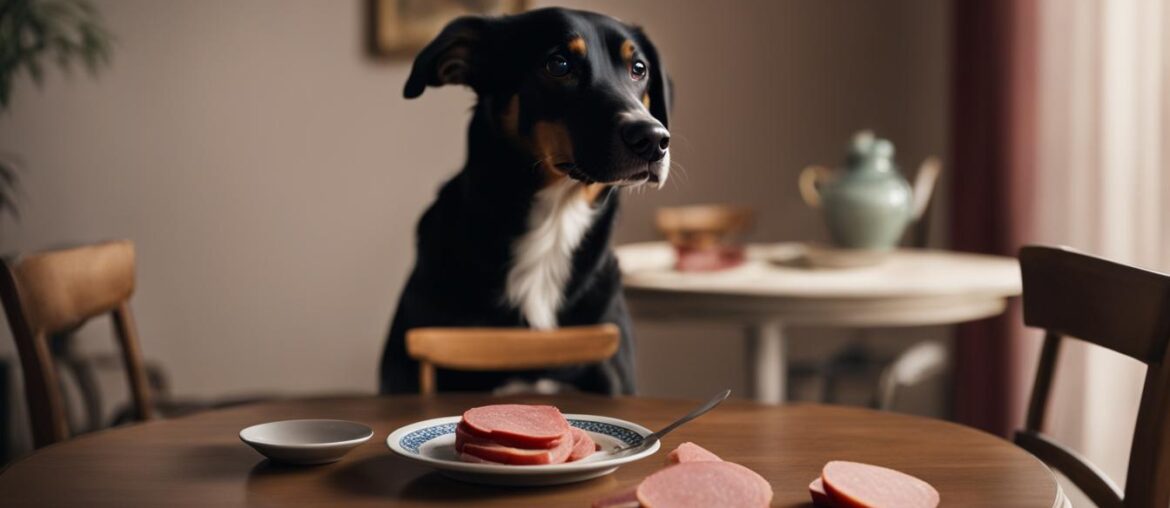As a pet owner, I understand the importance of providing a safe and nutritious diet for our furry friends. Dogs are beloved members of the family, and we want to make sure we offer them the best care possible, including the food they consume. One common question that arises is whether dogs can eat bologna. In this article, I will provide expert advice on the subject to help you make informed decisions regarding your dog’s nutrition and overall well-being.
When it comes to dog nutrition, it’s essential to understand that dogs are omnivores and require a diet rich in protein and fats. While bologna, a processed form of meat, may seem like a suitable option at first glance, it is not a healthy choice for our canine companions. Bologna typically contains high levels of sodium and additives that are not recommended for dogs. While feeding bologna to dogs as an occasional treat is generally safe, it should not be a staple in their diet.
Key Takeaways:
- Bologna is not a nutritionally ideal food for dogs and should not be a regular part of their diet.
- Feeding bologna to dogs in moderation is generally safe, but it should not be relied upon as a primary source of nutrition.
- Bologna often contains high levels of sodium and additives that can be harmful to dogs.
- There are healthier alternatives to bologna that can be offered to dogs, such as homemade sausages or meat patties made from safe ingredients.
- If a dog shows any unusual symptoms or experiences health problems after consuming bologna, it is important to consult a veterinarian.
Why Bologna is Not Recommended for Dogs
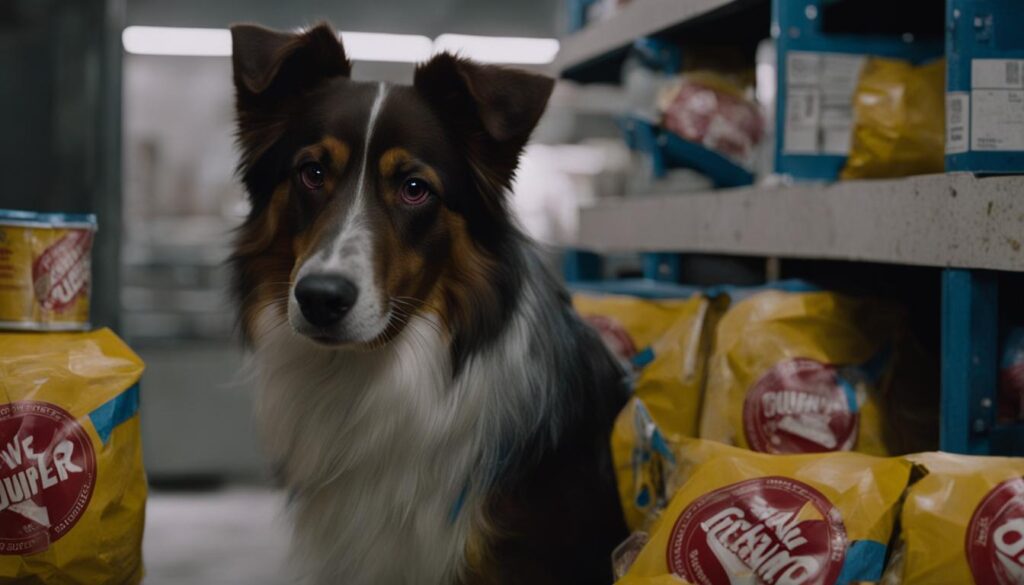
Bologna sausages are a popular processed meat product enjoyed by many people. However, when it comes to feeding bologna to dogs, there are several reasons why it is not recommended. Bologna contains ingredients and additives that can be harmful to dogs and may pose risks to their health.
One of the main concerns is the presence of ingredients like onion or garlic powder in many types of bologna. These ingredients are known to be toxic to dogs and can cause various health issues, including damage to red blood cells.
Furthermore, certain condiments often used with bologna, such as mayonnaise and mustard, are not safe for dogs to consume. These condiments can contain ingredients that are harmful to dogs, such as high levels of salt or toxic additives.
Another risk of feeding bologna to dogs is the possibility of triggering allergies. Bologna can be made with different types of meat and may include ingredients that dogs are allergic to. This can lead to allergic reactions, including skin rashes, itching, and digestive problems.
Expert Tip: It is best to avoid feeding bologna to dogs altogether to prevent potential health issues and ensure their well-being.
While dogs can technically eat bologna in small amounts, it is crucial to prioritize their dietary restrictions and overall health. There are alternative meats and safe human food options that can be offered to dogs, providing them with a balanced and nutritious diet without the potential risks associated with bologna.
| Risks of Feeding Bologna to Dogs | Canine Dietary Restrictions | Bologna and Pet Health |
|---|---|---|
|
|
|
By understanding the risks associated with bologna and considering the canine dietary restrictions, dog owners can make informed choices about their pets’ diets. It is recommended to consult with a veterinarian for further guidance on safe and healthy food options for dogs.
In the next section, we will explore alternative meats that are safer and more suitable for dogs, providing them with a variety of options to enjoy as treats or additions to their regular meals.
Safer Alternatives to Bologna for Dogs
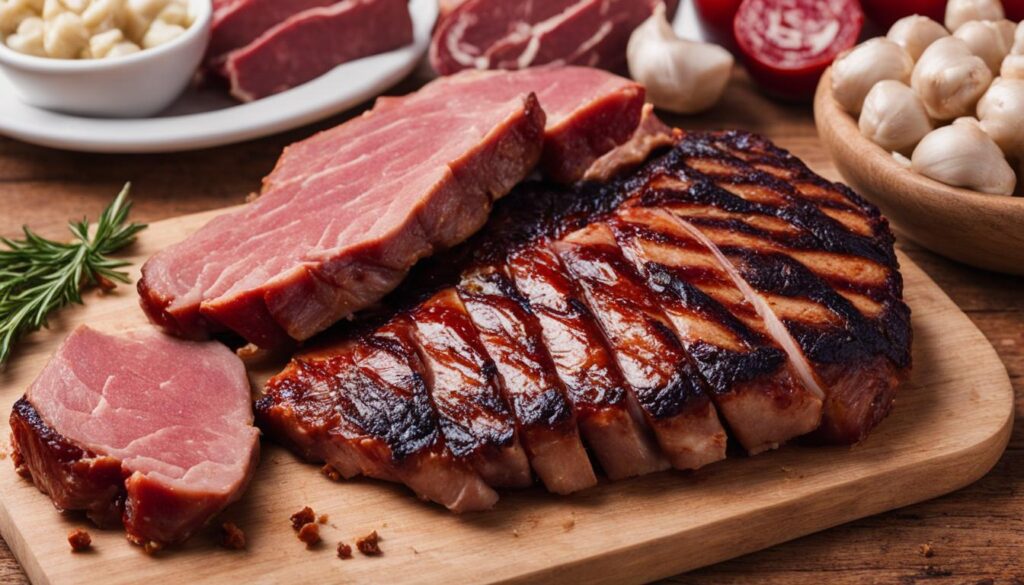
Instead of feeding bologna to dogs, there are several healthier alternatives that can be offered. Homemade sausages or meat patties made from a meat that the dog enjoys and is not allergic to can be a better option. It is important to use a meat grinder to produce finely ground meat, and avoid adding any additional seasonings. This allows for more control over the ingredients and ensures that the meat is safe for dogs to consume. Other meat-based snacks like meatballs, burgers, or mincemeat cakes can also be prepared for dogs, as long as they do not contain any potentially harmful ingredients.
Homemade Sausages
If you’re looking for a delicious and safe alternative to bologna for your furry friend, homemade sausages are a great option. By using high-quality ground meat, such as beef, turkey, or chicken, you can create a tasty treat that your dog will love. Just make sure to grind the meat finely and avoid using any seasonings or additives that may be harmful to dogs.
Meat Patties
Another alternative to bologna is homemade meat patties. By shaping ground meat into small patties, you can create a convenient and nutritious snack for your dog. Again, be sure to use a meat grinder to ensure the meat is finely ground and free from any potential contaminants or additives. Serve the patties cooked and cooled to a safe temperature for your dog to enjoy.
Other Meat-Based Snacks
If you’re feeling creative in the kitchen, there are plenty of other meat-based snacks you can prepare for your dog. Meatballs, burgers, and mincemeat cakes are all options that can be made with safe ingredients and without harmful additives. Just remember to keep these treats moderate in size and frequency to maintain a balanced diet for your furry friend.
Allergies and Bologna

Bologna can be made from a variety of meats, including chicken. If a dog has allergies to certain ingredients, such as chicken, feeding them bologna can unknowingly expose them to the allergen. It is important for dog owners to be aware of their dog’s allergies and avoid feeding them foods that contain potential allergens. For dogs with allergies, it is best to avoid bologna altogether and opt for safer food options.
Feeding bologna to dogs with allergies can lead to adverse reactions and discomfort for the animal. Allergic reactions can manifest in various ways, including skin irritation, gastrointestinal distress, and respiratory problems. It is crucial to prevent exposure to allergens that can trigger these reactions and prioritize the well-being of our canine companions.
Allergy Symptoms in Dogs
When dogs consume allergenic substances, they may exhibit a range of different symptoms. The specific signs can vary depending on the individual dog and the severity of the allergic reaction. Some common symptoms of allergies in dogs include:
- Itchy skin or excessive scratching
- Hives or skin rashes
- Red or inflamed skin
- Vomiting or diarrhea
- Sneezing or coughing
- Watery eyes or excessive tearing
If you notice any of these symptoms in your dog after they have consumed bologna or any other food, it is important to consult a veterinarian for further evaluation and guidance.
Can Dogs Eat Bologna in Moderation?
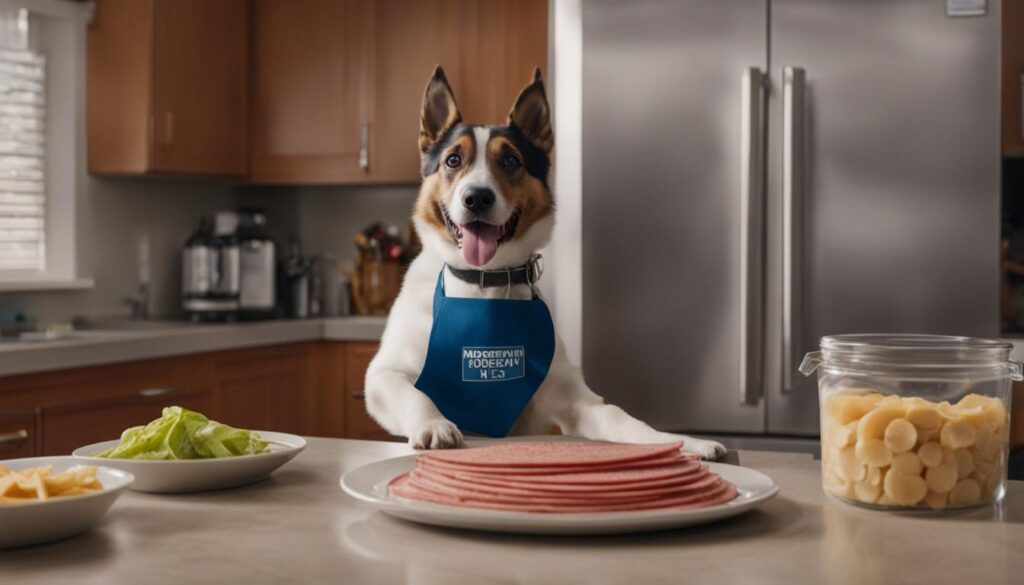
Feeding bologna to dogs in moderation is generally safe. While it is not a nutritionally ideal food for dogs, small amounts of bologna as an occasional treat are unlikely to cause harm. Dogs are omnivores and can consume a variety of foods, including some human foods, in moderation.
When feeding bologna to dogs, it is important to ensure that the bologna does not contain any toxic ingredients and that it is not expired. Some types of bologna can contain ingredients like onion or garlic powder, which are harmful to dogs. Always read the ingredient label and avoid bologna that contains any potentially toxic substances.
Monitoring the dog’s overall diet is essential when incorporating bologna into their meals. Bologna should not be a staple in a dog’s diet and should only be given occasionally as a treat. Dogs require a balanced and nutritious diet that includes high-quality dog food specially formulated to meet their nutritional needs. It is always best to consult with a veterinarian to determine the appropriate diet for a specific dog.
While small amounts of bologna may be enjoyed by dogs, it should not replace their regular meals. Feeding bologna in excess can lead to health issues such as obesity, digestive problems, and nutrient imbalances. It is important to prioritize a balanced diet that includes appropriate amounts of proteins, carbohydrates, and fats.
The Risks of Feeding Bologna to Dogs
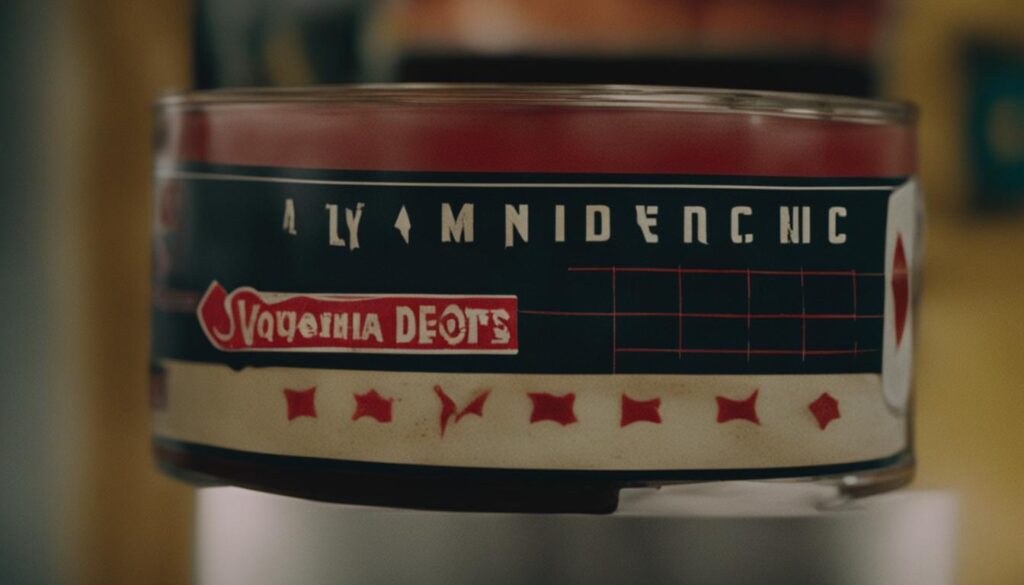
Regularly feeding bologna to dogs can lead to potential health risks. Bologna is high in sodium and processed additives, which can increase the risk of health issues such as high blood pressure and heart disease. The high fat content in bologna can also contribute to weight gain and obesity in dogs. Furthermore, the ingredients in bologna can vary, making it difficult to know exactly what is being fed to the dog. It is important to consider these risks and choose healthier food options for dogs.
Feeding bologna to dogs in moderation as an occasional treat is generally safe. However, regularly including bologna in their diet poses potential health risks. The high sodium and processed additives in bologna can lead to health issues such as high blood pressure and heart disease in dogs. Additionally, the high fat content in bologna can contribute to weight gain and obesity, which can lead to various health problems.
One of the concerns with feeding bologna to dogs is the varying ingredients and additives used in its preparation. Different brands and types of bologna may contain different ingredients, making it difficult to know exactly what is being consumed. Some bologna products may even include harmful additives or ingredients that can be toxic to dogs’ health.
When it comes to pet health, it is crucial to prioritize a balanced and nutritious diet. Opting for healthier food alternatives that are specifically formulated for dogs can help mitigate the risks associated with feeding bologna. High-quality dog food provides the necessary nutrients and is carefully crafted to meet the unique dietary needs of dogs.
In conclusion, although dogs may enjoy the taste of bologna, it is important to be mindful of the potential risks it carries. Regularly feeding bologna to dogs can lead to health complications due to its high sodium, processed additives, and varying ingredients. It is recommended to choose healthier food options that are specifically designed for dogs to ensure their overall well-being and prevent potential health issues.
Bologna and Dogs With Allergies
Bologna can pose a problem for dogs with allergies, as it may contain ingredients that dogs are allergic to, such as chicken. Feeding bologna to a dog with known allergies can unknowingly expose them to the allergen, potentially triggering allergic reactions. As responsible dog owners, it is crucial to be aware of our furry friends’ dietary restrictions and choose safer food options that do not contain potential allergens.
When it comes to allergic dogs, avoiding bologna altogether is the best course of action. Opting for alternative meats and treats that are free of known allergens can help prevent any adverse reactions. By being mindful of the ingredients in the food we offer our dogs, we can ensure their health and well-being.
If you suspect your dog has an allergic reaction after consuming bologna or any other food, it is essential to consult with a veterinarian. They can provide guidance, assess the situation, and recommend appropriate treatments if necessary. Allergic reactions can vary in severity, so it’s crucial to seek professional advice to safeguard your dog’s health.
When to Consult a Vet

If your dog shows any unusual symptoms or experiences health problems after consuming bologna, it is important to consult a veterinarian. Symptoms such as vomiting, diarrhea, or unusual behavior could indicate that the dog is having a negative reaction to the bologna. A veterinarian can provide guidance and determine if any further medical intervention is necessary.
If you notice any of the following symptoms in your dog after consuming bologna, it is recommended to seek veterinary assistance:
- Vomiting
- Diarrhea
- Lethargy
- Loss of appetite
- Abdominal pain
- Excessive drooling
- Difficulty breathing
These symptoms could indicate a potential adverse reaction or gastrointestinal upset that requires medical attention. Remember, dogs have different dietary restrictions and sensitivities, so it is always best to consult a professional when in doubt about your pet’s health.
Remember, dogs rely on us to make informed decisions about their diet and overall well-being. While bologna may be tempting to share with our furry friends, it is crucial to prioritize their health and opt for safer alternatives that meet their dietary requirements.
Wrapping Up
While dogs can technically eat bologna, it is not recommended as a regular part of their diet. Bologna is a processed meat product that contains additives and ingredients that can be harmful to dogs. Feeding bologna to dogs in moderation as an occasional treat is generally safe, but it is important to choose alternative, healthier options for dogs.
Homemade sausages or meat patties made from safe ingredients can be a better choice for dogs who enjoy meat snacks. By using a meat grinder and avoiding additional seasonings, dog owners can control the ingredients and ensure that the meat is safe for their pets to consume. Other meat-based snacks like meatballs, burgers, or mincemeat cakes can also be prepared for dogs, as long as they do not contain any potentially harmful ingredients.
Ultimately, it is crucial to prioritize a balanced and nutritious diet for dogs and avoid feeding them foods that can potentially cause health problems. While bologna may be tempting for our canine companions, it is best to consider the risks and opt for healthier alternatives that can provide the necessary nutrients without the potential harm.
FAQ
Is bologna safe for dogs to eat?
Bologna is not a healthy choice for dogs and should be avoided as a regular part of their diet.
Why is bologna not recommended for dogs?
Bologna is typically high in sodium and contains additives that are not recommended for dogs. It can also be made with ingredients that are toxic to dogs or trigger allergies.
What are safer alternatives to bologna for dogs?
Some healthier options include homemade sausages or meat patties made from safe ingredients that dogs enjoy.
Can dogs eat bologna in moderation?
Feeding bologna to dogs in moderation as an occasional treat is generally safe as long as it does not contain any toxic ingredients and is not expired.
What are the risks of feeding bologna to dogs?
Regularly feeding bologna to dogs can lead to health issues such as high blood pressure, heart disease, weight gain, and obesity. The ingredients in bologna can also vary and may not be known.
Can dogs with allergies eat bologna?
Bologna can contain ingredients that dogs are allergic to, such as chicken, so it is not recommended for dogs with known allergies.
When should I consult a vet regarding bologna and my dog’s health?
If your dog shows any unusual symptoms or experiences health problems after consuming bologna, it is important to consult a veterinarian for guidance and potential medical intervention.
Wrapping Up
While dogs can technically eat bologna, it is best to avoid feeding it to them regularly. There are healthier options available that can provide a balanced and nutritious diet for dogs.


